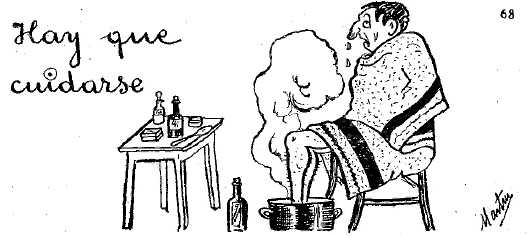
| Языки :: Испанский |
| Аудио |
 |
|
|
193 |
Español |
Spanish |
|
Lección Sesenta y ocho (68) |
||
| Recortes de periódicos | Newspaper cuttings. | |
| 1 |
Robo en el tranvía. — Cádiz, martes, 8 de Marzo. — Al agente de seguros F. A., cuando viajaba en un tranvía, |
Robbery in the tram. — Cadiz, Tuesday, March 8th. — As the insurance agent F. A. was travelling, on the tram, |
| 2 | le robaron la cartera, que contenía 6000 pesetas y su documentación. | they stole his wallet, which contained 6.000 p. and his identity papers. |
| 3 |
Para realizar el hecho, el desconocido carterista tuvo que cortar la americana y el bolsillo interior del chaleco de su victima (1). |
To perform his deed, the unknown pickpocket had to cut the coat, and waistcoat inside pocket of his victim. |
| 4 |
Accidente del trabajo. — Córdoba, miércoles, 7 de Agosto. — En una casa en construcción se rompió un andamio. |
Injured while working [Accident of work]. — Cordoba, Wednesday, Aug, 7 th. — In a house being built, a scaffolding broke |
| 5 | y cayeron diez obreros, de los cuales quedaron dos en grave estado (2). | and ten workmen fell down, among whom 2 are [remained] in a serious condition. |
| 6 | Los demás también resultaron heridos, pero de carácter leve. | The others were [resulted] also injured, but slightly [of light character]. |
| 7 | Hay que cuidarse, y vale más que tome Vd. (3) en seguida las pastillas X. | One must take care of oneself, and it is [worth] better that you should take at once the X lozenges. |
| 8 | Los resfriados, por benignos que parezcan (4) pueden tener malas consecuencias. | Chills, benign as they may seem [for b. that they s.], may have evil consequences. |
| 9 | Ya sabrá que no son legitimas si la caja no lleva la firma X. (5). | You will know for sure [already] that they are not genuine [legitimate] if they don't bear the signature X. |
| EJERCICIOS | EXERCISE : | |
| 1 | Málaga, lunes, 4 de Octubre. | Malaga. Monday. Oct. 4th. |
| 2 | En un cortijo de Campanillas fué corneado por un toro Antonio Castro. | In a farm of C, A. C. was horned by a bull, |
| 3 | que resultó con varias lesiones graves. | and suffered [resulting] several serious injuries. |
| 4 | Fué trasladado al hospital de esta ciudad. | He was taken to the hospital of this city. |
| Los periódicos no son un modelo de claridad ni de elegancia en su estilo, pero constituyen uno de los mejores medios de conocer la vida de un país, y por eso conviene leerlos. | The papers are not [a] model(s) of clarity [n]or elegance of style, but they afford one the best means to know the life of a country and for this it is suitable to read them. |
| NOTES. | |
| 1 |
Carterista (from (cartera), "wallet-man", pickpocket
— Yo tuve, el tuvo, I, he had, preterite of tener. — La americana, the coat (from chaqueta americana, American coat). |
| 2 |
Whose is cuyo only when denoting possession ; el hombre cuyo nombre (or apellido) yo conozco, the man whose name I know; el hombre del cual usted habla : the man of whom you speak. |
| 3 | Usted is often abridged into Vd., or simply V. (We know that usted comes from : Vuestra Merced.) |
| 4 |
I have a cold, I have caught (a) cold : Tengo un resfriado,
or Estoy resfriado. — I am cold : Tengo frío [I have c.]. — In the verbs of the parecer, conocer group, the z in found in all persons of the present subjunctive, whereas it is found only in the 1st person of the present indicative; yo parezco, Vd. parece, ellos parecen, I seem (appear), you seem, they seem. |
| 5 | La caja (cáHa), the box, not the cage, which is la jaula (Ha-_woola). |
